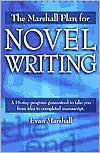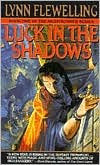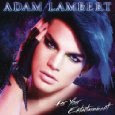Thursday, January 11, 2007
Finding Answers
Other work has kept me away for most of the past week, so I'm only now able to update my blog. However, I did keep my thoughts on the story questions.
I don't want to give the stories away, but I'll try to share what I can of the key questions and decisions, evidence that something is transpiring between my ears to justify my periodic haircuts.
One key question was whether or not to keep two minor characters on THE ISLE after the plane crashes. I went back and took out everything from Chapter 4 on, about 10,000 words, and completely rewrote several chapters there, WITHOUT those two pesky characters. The story works fine without them. Debra's point about checking whether they contribute to the complications enough to justify their presence hit home. The two characters were only derailing what was supposed to be the main focus of the conflict through their ever-expanding subplot. I can always find a creative way to bring them in later if I still need them.
The other big issue was to revisit my purpose for the story, the vision of the story that I wanted to tell, the point I wanted to get across. Of course, the story does not really belong to me: it's ultimately the main character's story, and that of the other characters, too, but that story needs to be one that I want to tell. I had worked this out already in my initial planning, but with the variable story lines emerging in the first draft I had to take another look and pin it down yet again.
To help me in this, I have been rereading Orson Scott Card's book on writing science fiction and fantasy. I had read it once before, but that doesn't mean I can't find additional insights as I read it again. A good book on writing is worth several readings at different times.
His sections on choosing the type of story have helped. He gives four: character-driven, event-driven, milieu-driven, or idea-driven (ie, question-driven). Most fantasy novels are event-driven, particularly epic fantasies. Something happens that sets things in motion, disturbs the order of things, and then there is an epic pursuit to restore order to the universe (ie, the world of the story). Mysteries are idea-driven, raising a question that needs answering ("whodunnit?" and "why?"). Character-driven stories focus on the need of a character to make some life change. Milieu stories focus on exploring some new world that is fascinating in itself. An example in the book is Gulliver's Travels, which focuses not so much on Gulliver as on all the strange worlds he encounters, which serve as social commentary when we compare them to our own place and time.
Also, the section on magic was helpful. My first novel, THE REFLECTING STONE, involves magic, and ultimately that fantastic element will reappear throughout the series. I still had some issues with that, questions in need of answers, and as I have worked again on this I have finally found some answers that I was looking for over the past year. This information will help me go back and edit THE REFLECTING STONE and will also help me in the present novel. I had previously blogged about needing to revise the mythology of THE REFLECTING STONE: that and magic are tied together. I did improve what I had, but it still was problematic. I think this time I've pinned it down enough that I can breathe a sigh of relief. Again, moving on to the second story is a big help as I look back at the first story with a sense that it needs completion and has a direction it must lead to. When I only had the first story to work with, getting some of those answers was harder to do. This second story reminds me there are things that happen after the first story, unrelated for the most part, but still drawing on some elements from that first story, the bigger ideas. Anyway, this current reflection has been immensely helpful.
Finally, I have allowed room for the story to grow, another thing addressed in OSC's book. I have been intuitively on a path of expanding my sense of how a story develops through planning, first draft, revision, and possible successive drafts. The past week has helped me gain an improved, conscious understanding of this process. I was trying to pack as much punch as possible into the planning and first draft to eliminate the need for a second complete draft, front-loading the thinking to save time with the rewriting. However, my editing of THE REFLECTING STONE got stalled and ultimately I think now it was because I was trying to put a lid on it, so to speak, when in fact the story development was not yet complete. The new answers I have gotten as I have solved problems with the next novel in the series, THE ISLE, have helped me to better understand the previous novel as well. So, stories must be given room to grow, and we as authors must allow them that space, and be patient, and keep working with them, cultivating them. It's definitely not helpful to attempt to gain closure or completion before it is possible to do so.
In summary, over the past week I've been able to rewrite the last 10,000 words, removing the unnecessary and distracting minor characters, regain the focus on the main character and his antagonist, and revisit the big picture, not only for the current novel, THE ISLE, but also for the novel which preceeds it in the series, THE REFLECTING STONE. In that work I have been able to better define the mythology and magic involved in the series. These stories are separate, but on some level they are also part of a larger series. How things will ultimately connect down the line is clearer now on the detail level (the big picture for the series has not changed).
Next goal is to go over my new ideas, make some detailed notes on them, a page or so, to capture the main points, how they will impact both novels, and then resume work on the first draft of THE ISLE.
More later, probably over the weekend!
Adrian
Subscribe to:
Post Comments (Atom)








1 comment:
It's definitely not helpful to attempt to gain closure or completion before it is possible to do so.
I certainly resemble that in writing A Lamentation of Swans! It's a lesson that I've painfully learned.
You're doing great work with your novels, and I enjoy reading your thoughts about it all.
Post a Comment